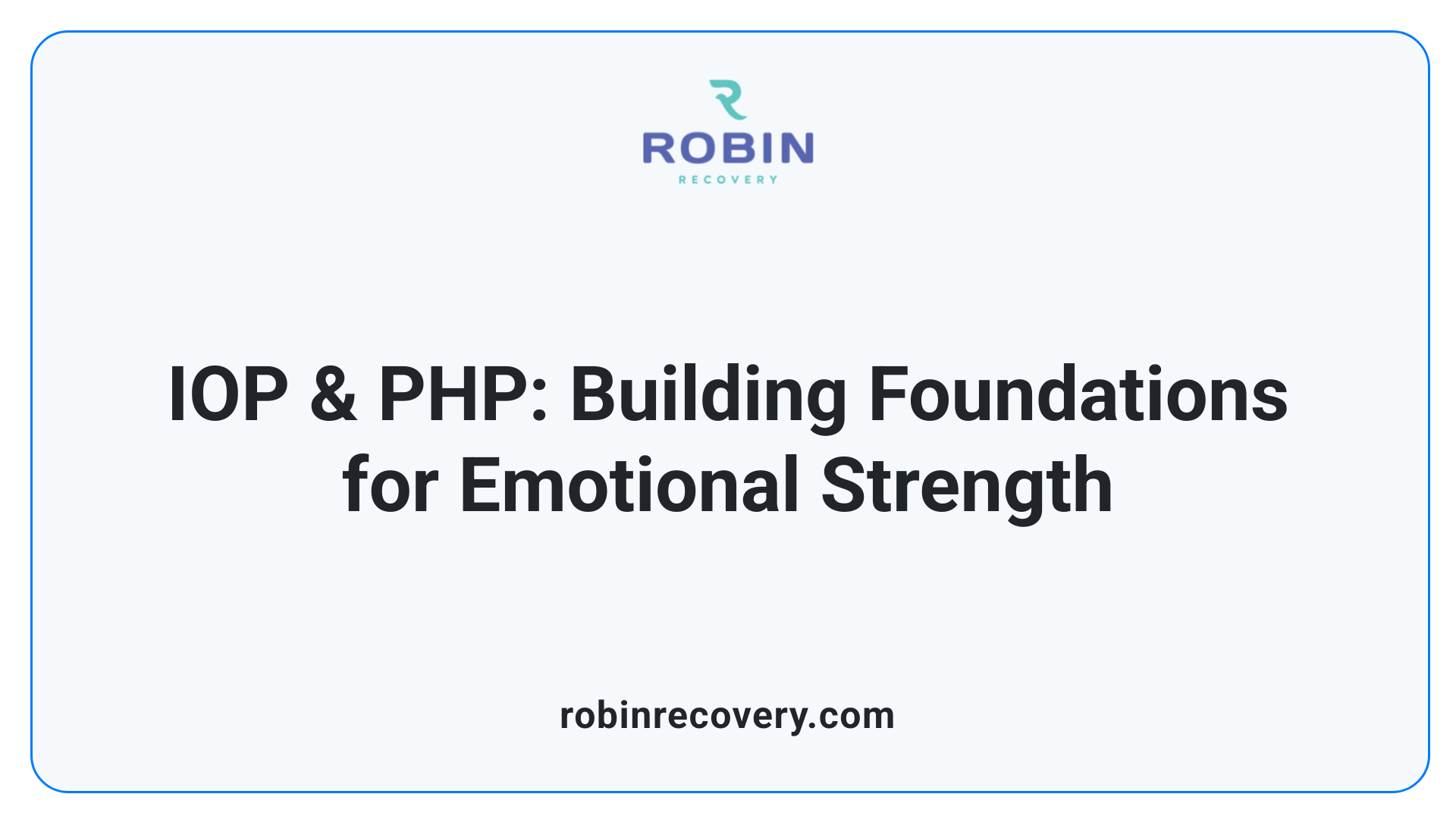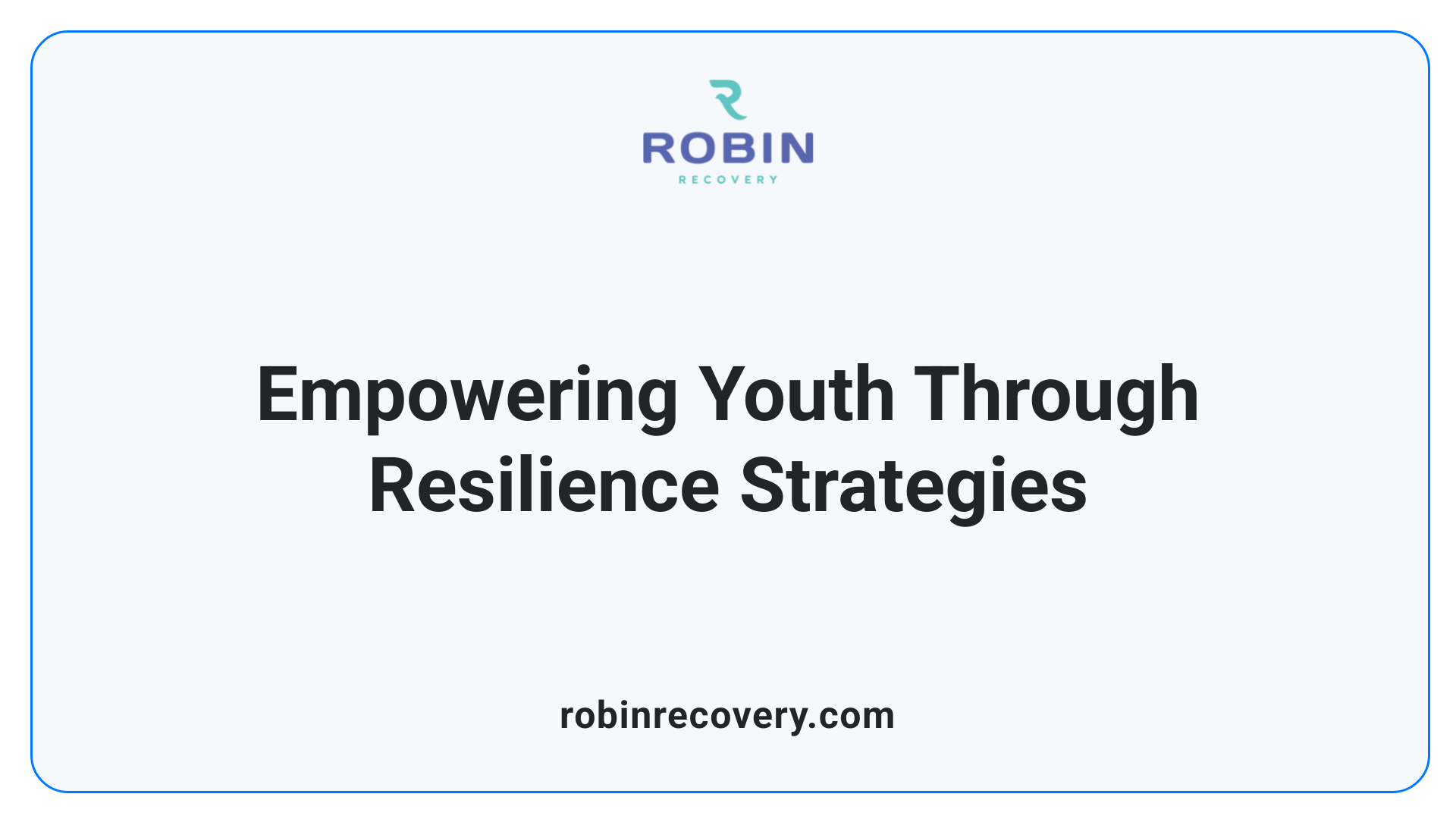How to Build Emotional Resilience in IOP and PHP Programs

Understanding Emotional Resilience in Mental Health and Substance Use Treatment
Building emotional resilience is a crucial aspect of mental health recovery, especially within Intensive Outpatient Programs (IOP) and Partial Hospitalization Programs (PHP). These structured therapeutic environments focus on teaching practical coping skills, fostering emotional growth, and ensuring long-term stability. This article explores effective strategies, program components, and community support systems that help individuals develop resilience, enabling them to navigate life's challenges with greater strength and confidence.
The Concept and Significance of Emotional Resilience

What is emotional resilience, and why is it important in mental health recovery?
Emotional resilience refers to the ability to effectively handle stress, setbacks, and unexpected challenges without becoming overwhelmed. It involves bouncing back from adversity and learning from difficult experiences, which helps maintain emotional stability.
This trait is vital during mental health recovery because it empowers individuals to manage intense emotions such as anxiety, sadness, or anger. When people develop resilience, they can better adapt to life's changes, reduce the effects of stress, and stay committed to their healing journey.
Several factors influence resilience, including age, past experiences, and personal identity. For instance, supportive relationships, a positive outlook, and a sense of purpose strengthen resilience.
Practicing healthy habits like staying optimistic, taking regular breaks, and reframing negative thoughts can boost resilience over time. Access to therapy, support groups, and wellness activities further enhances this capacity.
For young people and those in recovery, fostering emotional resilience is essential. It supports better coping, helps prevent relapse, and enhances overall mental wellbeing. Strengthening resilience ensures individuals are more equipped to face emotional challenges, leading to sustained recovery.
Strategies to Cultivate Emotional Resilience in Outpatient Programs
What techniques and strategies can help build emotional resilience in mental health treatment programs?
Building emotional resilience in outpatient programs involves a mix of practical, evidence-based approaches that help individuals manage stress, recover from setbacks, and develop a positive outlook. Core strategies include therapies like Cognitive Behavioral Therapy (CBT) and Dialectical Behavior Therapy (DBT), which are proven to enhance emotional regulation and coping skills.
CBT focuses on helping individuals identify and reframe negative thought patterns, fostering healthier perspectives and responses. Techniques like cognitive reframing teach clients to challenge unhelpful beliefs and replace them with more balanced viewpoints, increasing psychological flexibility.
Mindfulness practices, such as meditation and breathing exercises, are integral in helping individuals develop greater self-awareness. These techniques enable people to observe their thoughts and feelings without judgment, which can lessen reactions to stress and improve emotional regulation.
Stress management methods like progressive muscle relaxation, guided imagery, and deep breathing exercises are also fundamental. These practices lower physiological stress responses and promote a sense of calm, building resilience over time.
Furthermore, strong social support networks play a crucial role. Encouraging connections with family, friends, or peer groups provides emotional validation, practical assistance, and a sense of belonging, all of which strengthen resilience.
Together, these strategies—centered around evidence-based therapies, mindfulness, stress reduction, and social support—equip individuals with the tools needed to navigate life's challenges, maintain mental health, and foster long-term recovery.
The Role of IOP and PHP in Fostering Emotional Growth

How do IOP and PHP programs foster emotional resilience for recovery from mental health or substance use issues?
Intensive Outpatient Programs (IOP) and Partial Hospitalization Programs (PHP) play a vital role in building emotional resilience, which is essential for sustained recovery. These programs offer structured therapy sessions several times a week, creating a stable environment where clients can learn and practice coping skills.
A core aspect of their approach is the use of evidence-based therapies like Cognitive Behavioral Therapy (CBT) and Dialectical Behavior Therapy (DBT). These therapies target harmful thought patterns and emotional reactions, equipping individuals with techniques such as emotional regulation, mindfulness, and distress tolerance. Through regular sessions, clients develop the ability to manage stress, handle setbacks, and prevent relapse.
Beyond talk therapy, IOP and PHP programs incorporate holistic practices like mindfulness exercises, art therapy, music therapy, and physical activity. These methods foster self-awareness, promote relaxation, and enhance emotional stability.
Group therapy provides peer support and helps clients learn from others' experiences, reducing feelings of isolation. Meanwhile, individual counseling assists in addressing personal challenges and setting achievable goals.
Transition and continuity of care are also vital. Many clients progress from PHP to IOP, which allows for ongoing support while integrating skills into daily life. This phased approach underpins resilience—supporting clients in bouncing back from adversity and maintaining long-term wellness.
In summary, these programs nurture emotional resilience by combining structured, therapeutic activities with holistic practices, fostering skills needed for lasting recovery and growth.
Enhancing Coping Skills and Psychological Flexibility

What strategies can improve coping skills and psychological flexibility through structured treatment programs?
Structured treatment programs focus on developing adaptable coping mechanisms and fostering resilience. Central to these efforts are evidence-based therapies like Cognitive Behavioral Therapy (CBT) and Acceptance and Commitment Therapy (ACT). CBT helps individuals identify and challenge negative thought patterns, replacing them with healthier responses, while ACT encourages acceptance of difficult emotions and commitment to valued actions. These therapies promote mindfulness, present-moment awareness, and behavioral flexibility.
In addition to individual therapies, interprofessional interventions play a vital role. These include educational components, therapeutic sessions, physical activities such as yoga or exercise, and self-care practices. Together, they address cognitive, emotional, and behavioral needs, facilitating comprehensive support.
Monitoring progress with standardized assessments allows clinicians to tailor interventions effectively and track improvements over time. Incorporating physical activities and spiritual practices like meditation or journaling enhances overall well-being, helping individuals build resilience.
Table 1 below summarizes the main strategies used in programs to improve psychological flexibility:
Strategy Description Benefits Cognitive Behavioral Therapy (CBT) Reframes negative thoughts and modifies behaviors Reduces anxiety and depression symptoms Acceptance and Commitment Therapy (ACT) Emphasizes acceptance and committed action aligned with personal values Promotes psychological flexibility and resilience Mindfulness Training Cultivates present-moment awareness Lowers stress and improves emotional regulation Interprofessional Interventions Integrates therapy, physical activities, and education Addresses multiple domains of functioning Physical Activity & Self-Care Yoga, exercise, journaling, and relaxation Enhances mood and stress management
By combining these approaches, treatment programs help individuals develop adaptive responses, foster values-driven behaviors, and improve overall psychological resilience. Emphasizing flexibility in thoughts and actions equips clients to better manage life's challenges and sustain recovery.
Building Resilience in Teens and Young Adults in Outpatient Settings

What methods can strengthen emotional resilience in teens and young adults attending IOP and PHP?
Strengthening emotional resilience in teens and young adults within Intensive Outpatient Programs (IOP) and Partial Hospitalization Programs (PHP) involves several therapeutic and supportive strategies. Evidence-based approaches like Dialectical Behavior Therapy (DBT) and Trauma-Focused Cognitive Behavioral Therapy (TF-CBT) are central. These therapies focus on teaching coping skills, emotional regulation, and processing trauma effectively.
In addition to therapy, experiential activities such as mindfulness, yoga, art therapy, and journaling help individuals develop self-awareness and manage stress. These practices foster emotional balance and resilience by providing tools to handle distress and promote mental well-being.
Creating supportive environments that are trauma-informed and identity-affirming is essential, especially for LGBTQ+ youth. Such environments provide safety, validation, and respect, which are critical for fostering trust and belonging.
Peer support plays a vital role as well. Group therapy sessions enable teens to connect with peers, share experiences, and learn from others facing similar struggles. This normalization of emotional challenges encourages open communication and helps build a strong social support network.
Teaching practical skills like problem-solving, distress tolerance, and help-seeking promotes independence and confidence. These skills empower young people to better handle setbacks, reduce feelings of helplessness, and maintain long-term resilience.
Overall, combining evidence-based therapies, experiential activities, supportive environments, and peer connections creates a comprehensive approach to boost emotional resilience in youth, supporting their recovery and overall mental health.
Community and Resources: Building a Supportive Infrastructure
What role does community support and program components play in building emotional resilience?
Community support and program components are essential elements in fostering emotional resilience. They provide a sense of belonging and connection, which helps individuals feel validated and understood. When people engage with support networks, they receive emotional encouragement, practical help, and access to vital resources that assist in managing stress and adversity.
Supportive communities create safe spaces for open dialogue about mental health, reducing stigma and encouraging help-seeking behaviors. This openness enables individuals to share their experiences, learn from others, and develop coping skills in a trusting environment.
Activities such as peer groups, community events, and volunteering not only strengthen social bonds but also imbue a sense of purpose and achievement. These elements are crucial for emotional stability and growth.
Program components like safety protocols, cultural responsiveness, and peer support frameworks are tailored to meet diverse needs, enhancing their effectiveness. Overall, community involvement and well-structured programs build a resilient society where individuals are empowered to face challenges and recover from setbacks more effectively.
Fostering Lasting Emotional Strength for Long-term Recovery
Building emotional resilience within IOP and PHP settings is more than a transient goal; it is a lifelong journey of growth, self-awareness, and community engagement. These programs, through their comprehensive approaches—ranging from evidence-based therapies and holistic practices to peer support and educational efforts—lay a strong foundation for individuals to face future challenges with confidence and resilience. Encouraging continuous skill development, fostering safe and affirming environments, and leveraging community resources ultimately empower individuals to maintain gains, prevent relapse, and thrive in their ongoing recovery journey.
References
- Coping Skills Learned in PHP & IOP Programs
- Community Support: Key to Building Emotional Resilience
- How IOP Can Help You Take Control of Your Mental Health
- How IOP Helps Teens Build Confidence, Emotional ...
- How IOP and PHP Work Together to Ensure Long-Term ...
- How to Build Emotional Resilience, Not Resolutions
- Building Emotional Resilience During Recovery
